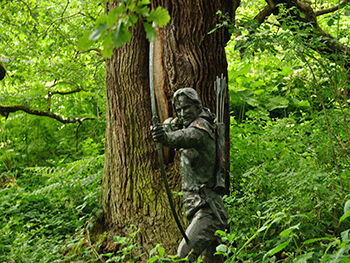Major 5G research funding boost for connectivity and tourism in Sherwood Forest
 A £10m project to improve connectivity, environmentalism and tourism in a UK Midlands landmark rural area, using research expertise from Birmingham City University, has been announced today.
A £10m project to improve connectivity, environmentalism and tourism in a UK Midlands landmark rural area, using research expertise from Birmingham City University, has been announced today.
The 5G Connected Forest testbed initiative, revealed this morning by the UK Department for Culture, Media and Sport, will see computer science experts from the University bring Robin Hood to life through the use of technology to aid the preservation of Sherwood Forest in Nottinghamshire through visitor experience, and help accelerate regional socio-economic growth.
The ancient woodland - which enjoys a legendary status worldwide thanks to the story of the English folklore hero from the area - will be home to the development and application of smart robotic forest rangers, autonomous vehicles and a super-sensitive sensor network for environmental monitoring and management as part of the project, which is being delivered alongside Nottinghamshire County Council and other partners.
A trio of specialists from the School of Computing and Digital Technology at Birmingham City University will also apply their expertise and experience to develop live AR and VR experiences for visitors of all ages and investigate high-speed business models that could lead to a boost in rural connectivity as well as the creation of innovative applications with the potential for commercial development.
Many rural areas in the UK are of regional or national historical significance with economies that rely on tourism. Using entertainment and gamification within tourism to test and promote low-cost infrastructure with private network operators within the Sherwood Forest test-bed, could establish an important precedent for connectivity across the rest of the UK using localised roaming, neutral hosting and empathetic ecosystem engagement. New and effective ways to improve connectivity in rural areas utilising 5G technology can lead to faster upload and download speeds, less latency in streaming, and accessibility to more on-demand gaming and streaming services, with positive implications for businesses and residents, emergency services, educational institutions and more.
Professor Mohammad Patwary, research lead for 5G Connected Forest and member of the Future Networks & Systems cluster at Birmingham City University's School of Computing and Digital Technology, said, "This is a unique opportunity for the UK to become a world-leader exploiting the technological innovation that 5G can offer. By developing and using innovative technology for destination branding for the visitor economy, we can also preserve the wellbeing of the environment and creating a scalable and sustainable commercial-grade experimental network.
Around £800,000 of DCMS funding has been ring-fenced for Professor Patwary and his team to create wireless networks, develop smart systems for robots and drones, produce mobile applications, apply new sensor technology and implement spectrum and network management over two years in partnership with Natural England, Netmore, Stagecoach, Nottingham Trent University and others. Work commences in early March 2020.
Professor Julian Beer, Deputy Vice-Chancellor of Birmingham City University, said, "Everything we intend to develop during the 5G Connected Forest project is scalable to any other visitor attraction around the world; we intend to pioneer the use of 5G connectivity in this way. We're thrilled that Birmingham City University researchers are at the heart of this important work.